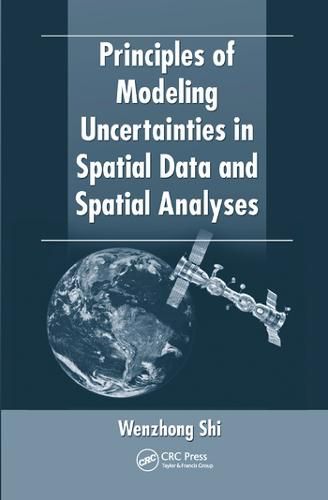Readings Newsletter
Become a Readings Member to make your shopping experience even easier.
Sign in or sign up for free!
You’re not far away from qualifying for FREE standard shipping within Australia
You’ve qualified for FREE standard shipping within Australia
The cart is loading…






When compared to classical sciences such as math, with roots in prehistory, and physics, with roots in antiquity, geographical information science (GISci) is the new kid on the block. Its theoretical foundations are therefore still developing and data quality and uncertainty modeling for spatial data and spatial analysis is an important branch of that theory. Principles of Modeling Uncertainties in Spatial Data and Spatial Analyses outlines the foundational principles and supplies a firm grasp of the disciplines’ theoretical underpinnings.
Comprehensive, Systematic Review of Methods for Handling Uncertainties
The book summarizes the principles of modeling uncertainty of spatial data and spatial analysis, and then introduces the developed methods for handling uncertainties in spatial data and modeling uncertainties in spatial models. Building on this foundation, the book goes on to explore modeling uncertainties in spatial analyses and describe methods for presentation of data as quality information. Progressing from basic to advanced topics, the organization of the contents reflects the four major theoretical breakthroughs in uncertainty modeling: advances in spatial object representation, uncertainty modeling for static spatial data to dynamic spatial analyses, uncertainty modeling for spatial data to spatial models, and error description of spatial data to spatial data quality control.
Determine Fitness-of-Use for Your Applications
Modeling uncertainties is essential for the development of geographic information science. Uncertainties always exist in GIS and are then propagated in the results of any spatial analysis. The book delineates how GIS can be a better tool for decision-making and demonstrates how the methods covered can be used to control the data quality of GIS products.
$9.00 standard shipping within Australia
FREE standard shipping within Australia for orders over $100.00
Express & International shipping calculated at checkout
When compared to classical sciences such as math, with roots in prehistory, and physics, with roots in antiquity, geographical information science (GISci) is the new kid on the block. Its theoretical foundations are therefore still developing and data quality and uncertainty modeling for spatial data and spatial analysis is an important branch of that theory. Principles of Modeling Uncertainties in Spatial Data and Spatial Analyses outlines the foundational principles and supplies a firm grasp of the disciplines’ theoretical underpinnings.
Comprehensive, Systematic Review of Methods for Handling Uncertainties
The book summarizes the principles of modeling uncertainty of spatial data and spatial analysis, and then introduces the developed methods for handling uncertainties in spatial data and modeling uncertainties in spatial models. Building on this foundation, the book goes on to explore modeling uncertainties in spatial analyses and describe methods for presentation of data as quality information. Progressing from basic to advanced topics, the organization of the contents reflects the four major theoretical breakthroughs in uncertainty modeling: advances in spatial object representation, uncertainty modeling for static spatial data to dynamic spatial analyses, uncertainty modeling for spatial data to spatial models, and error description of spatial data to spatial data quality control.
Determine Fitness-of-Use for Your Applications
Modeling uncertainties is essential for the development of geographic information science. Uncertainties always exist in GIS and are then propagated in the results of any spatial analysis. The book delineates how GIS can be a better tool for decision-making and demonstrates how the methods covered can be used to control the data quality of GIS products.